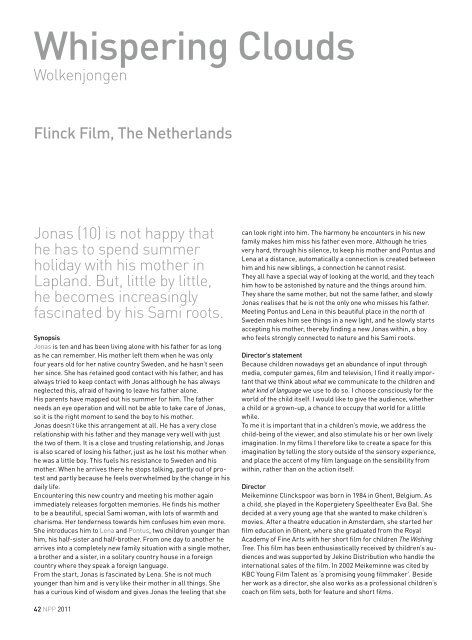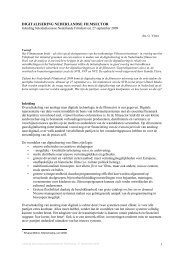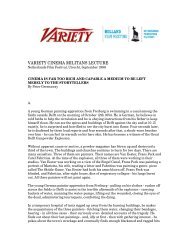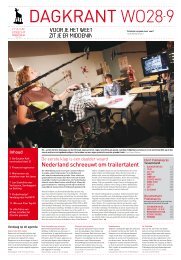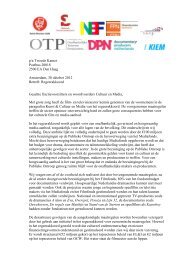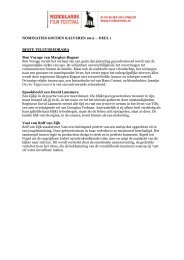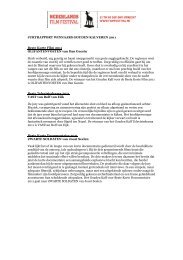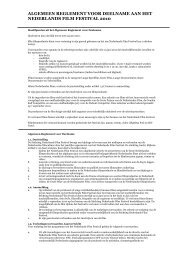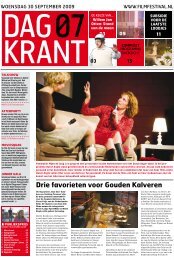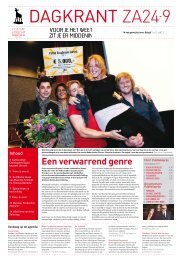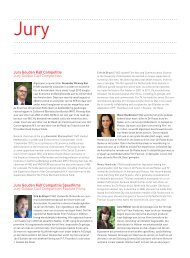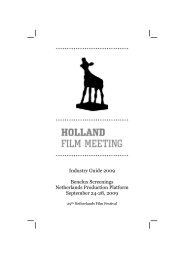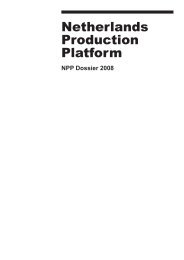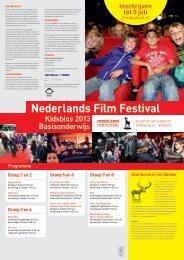Netherlands Production Platform dossier 2011 - Nederlands Film ...
Netherlands Production Platform dossier 2011 - Nederlands Film ...
Netherlands Production Platform dossier 2011 - Nederlands Film ...
Create successful ePaper yourself
Turn your PDF publications into a flip-book with our unique Google optimized e-Paper software.
Whispering Clouds<br />
Wolkenjongen<br />
Flinck <strong>Film</strong>, The <strong>Netherlands</strong><br />
Jonas (10) is not happy that<br />
he has to spend summer<br />
holiday with his mother in<br />
Lapland. But, little by little,<br />
he becomes increasingly<br />
fascinated by his Sami roots.<br />
Synopsis<br />
Jonas is ten and has been living alone with his father for as long<br />
as he can remember. His mother left them when he was only<br />
four years old for her native country Sweden, and he hasn’t seen<br />
her since. She has retained good contact with his father, and has<br />
always tried to keep contact with Jonas although he has always<br />
neglected this, afraid of having to leave his father alone.<br />
His parents have mapped out his summer for him. The father<br />
needs an eye operation and will not be able to take care of Jonas,<br />
so it is the right moment to send the boy to his mother.<br />
Jonas doesn’t like this arrangement at all. He has a very close<br />
relationship with his father and they manage very well with just<br />
the two of them. It is a close and trusting relationship, and Jonas<br />
is also scared of losing his father, just as he lost his mother when<br />
he was a little boy. This fuels his resistance to Sweden and his<br />
mother. When he arrives there he stops talking, partly out of protest<br />
and partly because he feels overwhelmed by the change in his<br />
daily life.<br />
Encountering this new country and meeting his mother again<br />
immediately releases forgotten memories. He finds his mother<br />
to be a beautiful, special Sami woman, with lots of warmth and<br />
charisma. Her tenderness towards him confuses him even more.<br />
She introduces him to Lena and Pontus, two children younger than<br />
him, his half-sister and half-brother. From one day to another he<br />
arrives into a completely new family situation with a single mother,<br />
a brother and a sister, in a solitary country house in a foreign<br />
country where they speak a foreign language.<br />
From the start, Jonas is fascinated by Lena. She is not much<br />
younger than him and is very like their mother in all things. She<br />
has a curious kind of wisdom and gives Jonas the feeling that she<br />
can look right into him. The harmony he encounters in his new<br />
family makes him miss his father even more. Although he tries<br />
very hard, through his silence, to keep his mother and Pontus and<br />
Lena at a distance, automatically a connection is created between<br />
him and his new siblings, a connection he cannot resist.<br />
They all have a special way of looking at the world, and they teach<br />
him how to be astonished by nature and the things around him.<br />
They share the same mother, but not the same father, and slowly<br />
Jonas realises that he is not the only one who misses his father.<br />
Meeting Pontus and Lena in this beautiful place in the north of<br />
Sweden makes him see things in a new light, and he slowly starts<br />
accepting his mother, thereby finding a new Jonas within, a boy<br />
who feels strongly connected to nature and his Sami roots.<br />
Director’s statement<br />
Because children nowadays get an abundance of input through<br />
media, computer games, film and television, I find it really important<br />
that we think about what we communicate to the children and<br />
what kind of language we use to do so. I choose consciously for the<br />
world of the child itself. I would like to give the audience, whether<br />
a child or a grown-up, a chance to occupy that world for a little<br />
while.<br />
To me it is important that in a children’s movie, we address the<br />
child-being of the viewer, and also stimulate his or her own lively<br />
imagination. In my films I therefore like to create a space for this<br />
imagination by telling the story outside of the sensory experience,<br />
and place the accent of my film language on the sensibility from<br />
within, rather than on the action itself.<br />
Director<br />
Meikeminne Clinckspoor was born in 1984 in Ghent, Belgium. As<br />
a child, she played in the Kopergietery Speeltheater Eva Bal. She<br />
decided at a very young age that she wanted to make children’s<br />
movies. After a theatre education in Amsterdam, she started her<br />
film education in Ghent, where she graduated from the Royal<br />
Academy of Fine Arts with her short film for children The Wishing<br />
Tree. This film has been enthusiastically received by children’s audiences<br />
and was supported by Jekino Distribution who handle the<br />
international sales of the film. In 2002 Meikeminne was cited by<br />
KBC Young <strong>Film</strong> Talent as ‘a promising young filmmaker’. Beside<br />
her work as a director, she also works as a professional children’s<br />
coach on film sets, both for feature and short films.<br />
<strong>Production</strong> company<br />
Flinck <strong>Film</strong> is a film and TV production company founded by<br />
Michiel de Rooij and Sabine Veenendaal in 2009. In Flinck <strong>Film</strong> we<br />
apply the experience and knowledge we acquired as producers of<br />
films like Het Paard van Sinterklaas (Winky’s Horse), Waar is het Paard<br />
van Sinterklaas (Where is Winky’s Horse), Hoe overleef ik mezelf<br />
(How to Survive Myself) and Morrison. We are moved by stories in<br />
which the main character undergoes a real development. In many<br />
cases, these children are grieving in some way. That grief may not<br />
be solved by the end of the film, but the things that the child experiences<br />
or discovers in the story can help process the grief, which<br />
puts everything into a different perspective, enabling the child to<br />
move on.<br />
It is important to Flinck <strong>Film</strong> that we find attractive and exceptional<br />
stories that appeal both to children and adults. Flinck focuses<br />
primarily on making high-quality children’s/family films and TV<br />
series (based on both published literature and original scripts) for<br />
a wide audience.<br />
Current status<br />
Finalising script and financing project. Co-production partner:<br />
Breidablick <strong>Film</strong> (Sweden)<br />
Finance in place: €32,500.<br />
Aims at the NPP<br />
To find Scandinavian distributors and broadcasters.<br />
Meikeminne Clinckspoor<br />
Director<br />
Meikeminne Clinckspoor<br />
Producer<br />
Sabine Veenendaal<br />
Writer<br />
Meikeminne Clinckspoor<br />
Based on<br />
an original story<br />
Languages<br />
Swedish, Dutch<br />
Genre<br />
Coming-of-age<br />
Running time<br />
80 mins<br />
Target audience<br />
8+<br />
Budget<br />
€1,500,000<br />
Contact<br />
Sabine Veenendaal<br />
Flinck <strong>Film</strong><br />
Tweede Jan Steenstraat 23H<br />
1073 VL Amsterdam<br />
The <strong>Netherlands</strong><br />
Phone: +31 20 570 31 30<br />
Email: sabine@flinckfilm.nl<br />
www.flinckfilm.nl<br />
Sabine Veenendaal<br />
42 NPP <strong>2011</strong><br />
<strong>2011</strong> NPP 43


